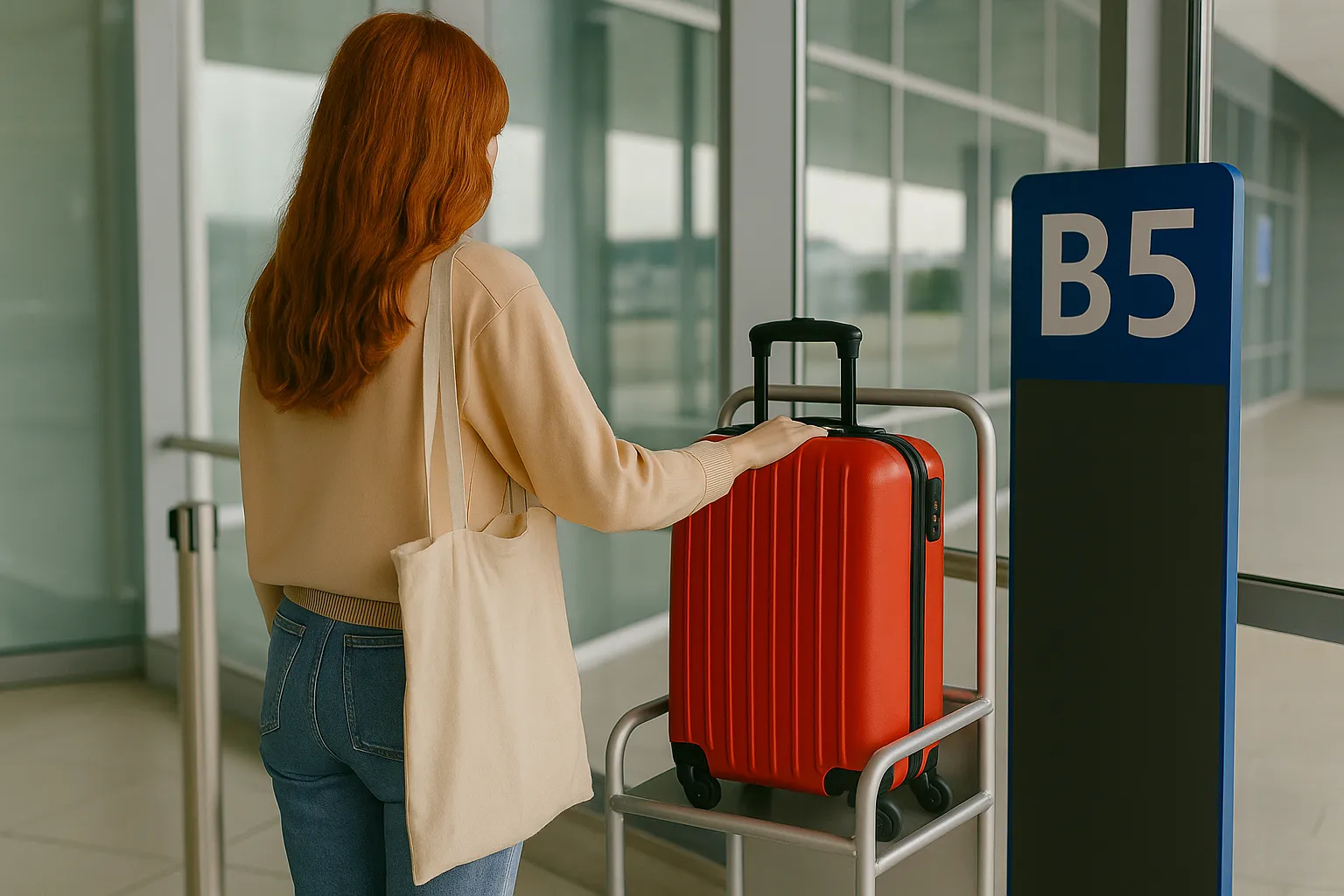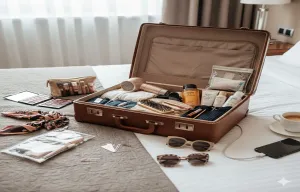Każda podróż zaczyna się nie od drogi, lecz od walizki. Pakując rzeczy, nieświadomie pakujemy też nasze lęki, przyzwyczajenia i wspomnienia. Często nawet nie zauważamy, że wraz z butami i kosmetykami wkładamy do środka niepokój, potrzebę kontroli i chęć bycia przygotowanym na każdy scenariusz. Jednak im cięższy bagaż, tym mniej miejsca na prawdziwe doświadczenia. Nauka dawno udowodniła: im lżejsze ciało, tym bardziej wolny umysł. Z kolei fizyczne przeciążenie tworzy chaos w głowie, nawet wtedy, gdy widok z okna samolotu wydaje się idealny.
Minimalizm w podróżowaniu to nie moda, lecz potrzeba fizjologiczna. Nasze neurony, hormony i układ nerwowy działają najlepiej, gdy środowisko zmysłowe nie jest przeciążone. Lekka walizka to nie tylko wygoda — to sposób na obniżenie poziomu kortyzolu i aktywację układu nagrody w mózgu. Psycholodzy i badacze zachowań coraz częściej mówią dziś o „nauce lekkości” jako o kluczu do spokojnego przemieszczania się po świecie.
Podróż jako test przywiązania
Człowiek z natury jest kolekcjonerem. Gromadzimy rzeczy, by czuć kontrolę. Wszystko, co „nasze”, wysyła do mózgu sygnał bezpieczeństwa. W czasie przygotowań do podróży ten mechanizm się nasila: chcemy zabrać więcej, niż potrzebujemy, by uspokoić lęk przed nieznanym. Ewolucyjnie miało to sens — kiedyś brak zapasów oznaczał zagrożenie. Dziś nadmiar daje odwrotny efekt: każdy dodatkowy przedmiot wywołuje mikro-sygnał stresu i przeciąża korę przedczołową odpowiedzialną za podejmowanie decyzji. Przeładowana walizka to często metafora przeładowanego umysłu.
Badania Uniwersytetu Harvarda pokazują, że osoby, które celowo ograniczają liczbę rzeczy — w domu lub w podróży — mają stabilniejsze tętno i niższy poziom kortyzolu w ciągu dnia. To nie tylko „mniej rzeczy”, lecz mniej bodźców dla mózgu, mniej wyborów, mniej napięcia. W zamian zyskujemy więcej uważności i spokoju.
Mózg minimalisty
Minimalizm nie oznacza wyrzeczeń, lecz skupienie uwagi. Gdy mózg widzi porządek, wydziela dopaminę — ten sam neuroprzekaźnik, który pojawia się przy osiągnięciu celu lub miłej niespodziance. Dlatego pakowanie według planu daje przyjemność. Psycholodzy nazywają to „efektem ustrukturyzowanego działania”: przewidywalność zmniejsza lęk, a kolejność ruchów daje poczucie kontroli. System dopaminowy reaguje nie tylko na zdobywanie, ale też na organizowanie — dlatego minimalizm daje radość, a nie ograniczenie.
Badania Uniwersytetu Kalifornijskiego dowodzą, że bałagan w domu zwiększa poziom stresu u kobiet nawet o 40%, podczas gdy porządek zmniejsza go niemal o połowę. Podobnie w podróży — gdy zawartość walizki jest uporządkowana, mózg odbiera to jako sygnał bezpieczeństwa i aktywuje układ przywspółczulny. To stan „miękkiej gotowości” — ciało porusza się swobodnie, a układ nerwowy pozostaje spokojny.
Dlaczego pakujemy za dużo
Przyczyn jest kilka — biologicznych i społecznych. Po pierwsze, ewolucyjny lęk przed brakiem zasobów. Mózg jest zaprogramowany, by gromadzić „na wszelki wypadek”. Przepełnianie walizki to próba walki z wyobrażonym ryzykiem przyszłości. Po drugie, presja społeczna: reklama i media społecznościowe uczą nas, że musimy być „gotowi na wszystko”. Jednak nadmiar wyboru prowadzi do paradoksu — zamiast wolności czujemy napięcie. W psychologii poznawczej nazywa się to „przeciążeniem wyborem” (ang. choice overload).
Trzeci powód to przyzwyczajenie sensoryczne. Postrzegamy swoje rzeczy jako część siebie, więc gdy ich brakuje, pojawia się uczucie pustki. Jednak właśnie ta przestrzeń pozwala doświadczać nowych bodźców. Mniej hałasu — więcej świata.
Naukowe zasady „lekkiej walizki”
Aby ograniczyć liczbę rzeczy, zachowując komfort, warto traktować pakowanie nie jak logistykę, lecz jako praktykę regulacji układu nerwowego. Oto kilka zasad potwierdzonych badaniami:
- Ekonomia sensoryczna. Mózg szybciej się męczy przy nadmiarze kolorów i faktur. Ogranicz paletę do 2–3 odcieni bazowych — to wycisza i uspokaja.
- Formuła 3×3×3. Trzy góry, trzy doły, trzy dodatki — do dziewięciu kombinacji bez nadmiaru.
- Równowaga energetyczna. Mniejszy ciężar to mniejsze napięcie mięśni i mniej utraconej energii w ruchu. Lekkie ciało — spokojny umysł.
Mikropraktyki planowania
Zamiast pytać „Co zabrać?”, zapytaj „Czego naprawdę potrzebuję, by czuć się dobrze?”. Taka zmiana kieruje uwagę z zewnątrz do wewnątrz. Neuropsycholodzy polecają zasadę 48 godzin: jeśli czegoś nie używałeś w domu przez dwa dni, prawdopodobnie nie będzie ci to potrzebne w podróży. Inna metoda to test sensoryczny — dotknij przedmiotu i zapytaj siebie, czy daje poczucie lekkości. Jeśli nie — zostaw go.
Stwórz swój rytuał pakowania: spokojna muzyka, świeca, filiżanka herbaty. Kiedy proces nabiera znaczenia, ciało zapamiętuje go jako część podróży. Nawet przygotowania stają się formą troski o siebie i równowagi przed ruchem.
Higiena psychiczna walizki
Każdy przedmiot, który zabierasz, wpływa na twoje emocje. Psycholodzy zalecają „audyt sensoryczny”: rzeczy powinny być zrozumiałe dla mózgu, przyjemne w dotyku i wolne od napięcia. Bałagan aktywuje ciało migdałowate, które reaguje na zagrożenie. Z kolei porządek uruchamia układ przywspółczulny, odpowiedzialny za odpoczynek i regenerację.
Opracuj swój rytuał pakowania — spokojny oddech, uważne ruchy, brak pośpiechu. Przewidywalność daje mózgowi sygnał bezpieczeństwa. Badania wykazują, że taki stan obniża tętno i poprawia zmienność rytmu serca — jeden z najważniejszych wskaźników odporności na stres.
Sztuka odpuszczania
Umiejętność puszczania to także kompetencja. Kiedy pozbywamy się nadmiaru, mózg ćwiczy tak zwaną elastyczność dopaminową — zdolność czerpania satysfakcji nie tylko z posiadania, lecz także z uwalniania przestrzeni. Badania Uniwersytetu Stanforda pokazują, że porządkowanie i pozbywanie się rzeczy aktywuje te same szlaki nagrody, co osiąganie celów. Biochemicznie „odpuścić” jest równie przyjemne, jak „zyskać”.
Zmniejszenie liczby rzeczy redukuje obciążenie sensoryczne, co oznacza mniej bodźców i więcej spokoju. W podróży to szczególnie ważne: wolny umysł lepiej rejestruje nowe obrazy, dźwięki i zapachy — właśnie po to podróżujemy.
Estetyka minimalizmu w pielęgnacji skóry
Minimalizm w kosmetyce to kolejny wymiar świadomej lekkości. Zamiast dziesiątek buteleczek wystarczą cztery uniwersalne produkty o potwierdzonej skuteczności: delikatny żel do mycia, serum nawilżające, lekki krem i SPF. W czasie podróży skóra i tak przeżywa stres — nadmiar kosmetyków może tylko zwiększyć wrażliwość. Marka Union Beauty oferuje travel-formaty łączące funkcjonalność i estetykę — kwintesencję filozofii minimalizmu.
Fizjologia lekkości
Minimalny bagaż to nie tylko estetyka, ale i zdrowie. Zmniejszenie ciężaru redukuje napięcia w ramionach, poprawia postawę i krążenie krwi. Badania Uniwersytetu Michigan wykazały, że długotrwałe noszenie ciężaru podnosi poziom kortyzolu w mięśniach i sprzyja chronicznemu zmęczeniu. Gdy ciało porusza się bez wysiłku, mózg otrzymuje jasny sygnał: „Jestem bezpieczny”.
Lekkość to nie asceza, lecz fizjologiczna harmonia. Ciało, które porusza się swobodnie, lepiej oddycha, widzi, czuje i myśli. Podróż z mniejszym bagażem to podróż bez szumu — gdzie najważniejsze nie jest to, co zabierasz, lecz to, co odkrywasz.
Formuła XXI wieku
Mniej rzeczy — więcej doświadczeń. W tym prostym równaniu kryje się logika ewolucyjna. Im mniej bodźców odbiera układ nerwowy, tym lepiej się regeneruje. Podróżowanie lekko to nie moda, lecz sposób samoregulacji — troska o energię, spokój i świadomość.
Więc następnym razem, gdy będziesz się pakować, nie pytaj „Co jeszcze zabrać?”, lecz „Co mogę zostawić?”. Prawdziwa wolność zaczyna się wtedy, gdy między tobą a nowymi doświadczeniami nie ma nic zbędnego.





